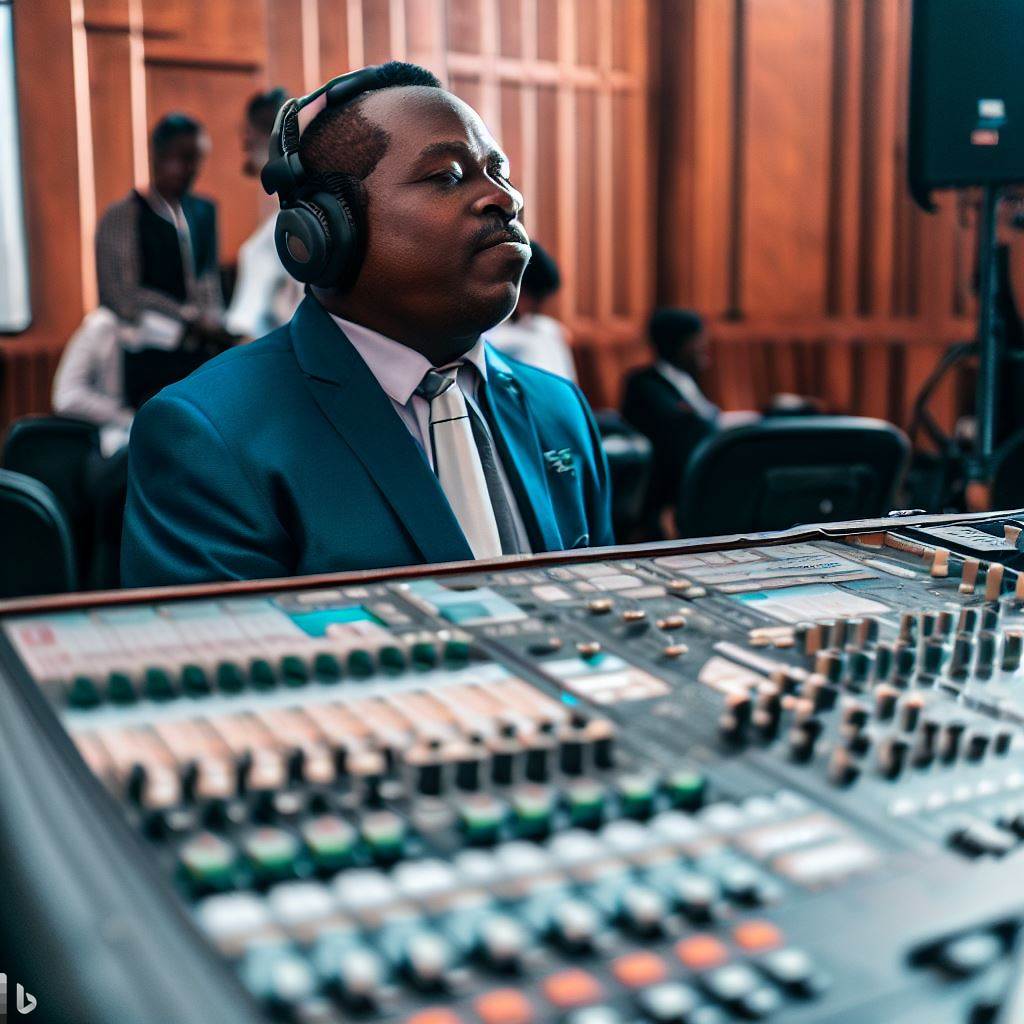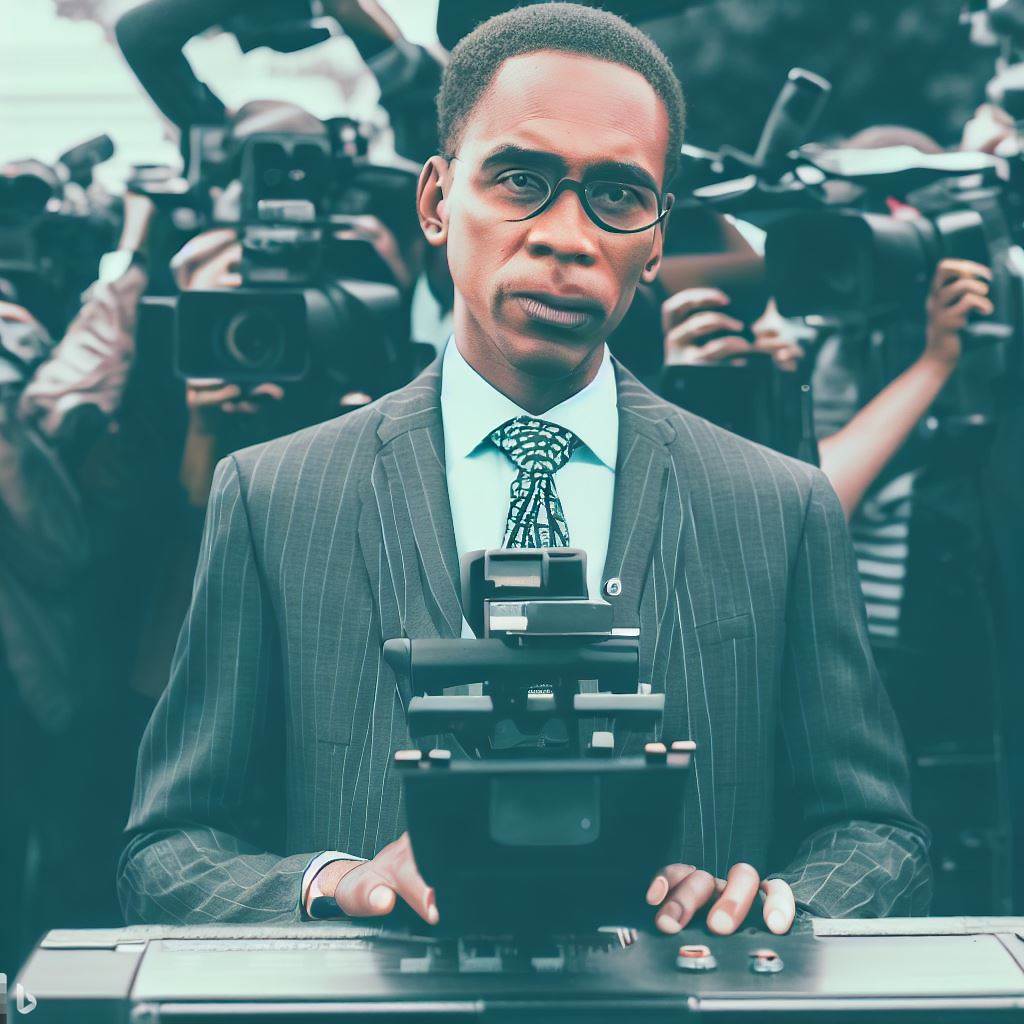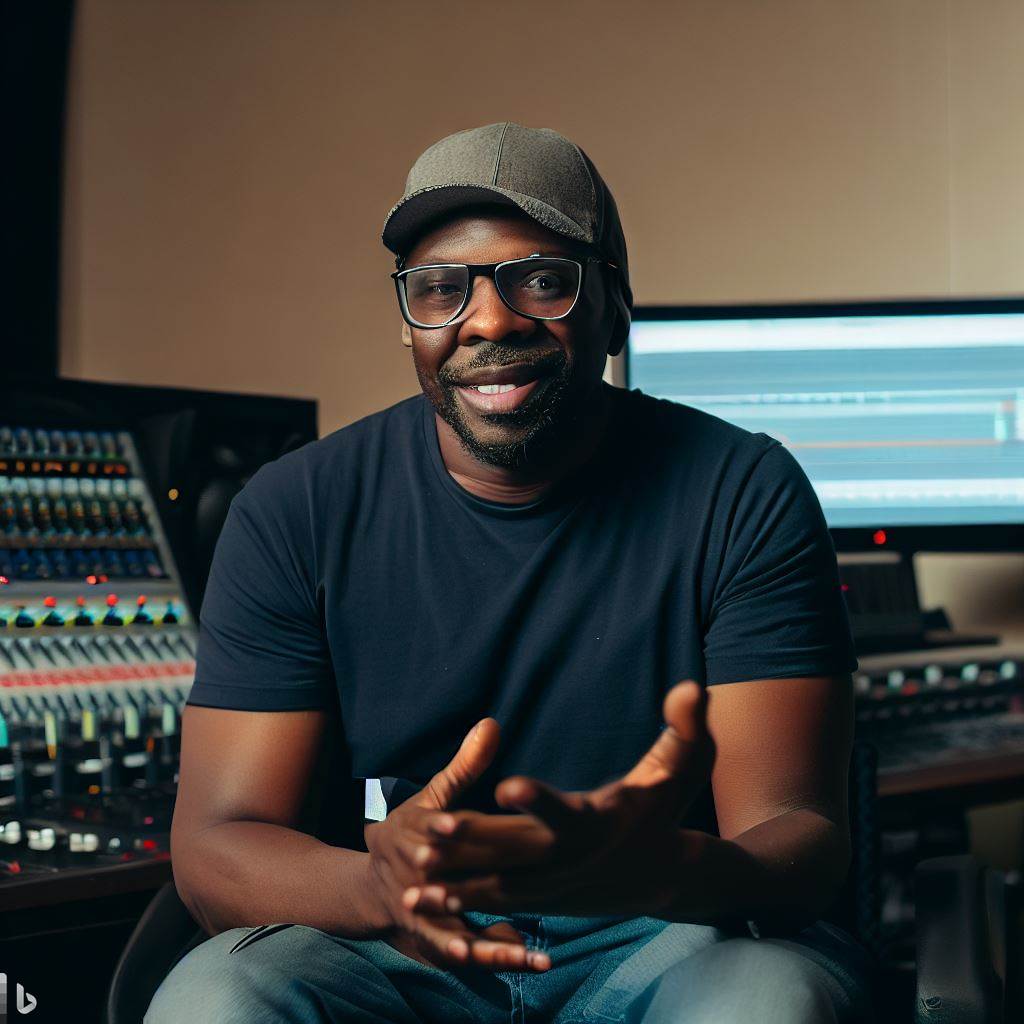Introduction
In Nigeria’s film industry, sound editing plays a vital role in creating engaging cinematic experiences.
With advancements in technology, sound editors ensure that audio elements align perfectly with visual storytelling.
However, they must also navigate various legal considerations unique to their profession.
One crucial element in sound editing is obtaining proper licensing for the use of music and other sound effects.
Copyright laws protect the rights of composers and musicians, making it essential for sound editors to secure the necessary permissions to use copyrighted material in their work.
Additionally, sound editors need to be aware of contracts and agreements related to their services.
Negotiating and signing clear contracts with filmmakers is essential to establishing the scope of work, payment terms, and ownership rights.
Furthermore, intellectual property laws come into play when sound editors create original sound designs.
It is vital to understand the legal framework surrounding the protection of these creations to ensure they receive recognition and compensation for their work.
Moreover, sound editors must adhere to Nigerian regulatory bodies’ guidelines when it comes to censorship and content restrictions.
They should be knowledgeable about the country’s film classification system to uphold ethical standards and avoid legal repercussions.
In fact, sound editing plays a critical role in the Nigerian film industry, and sound editors must navigate various legal considerations.
The importance of obtaining proper licensing, understanding contracts, protecting intellectual property, and adhering to regulatory guidelines cannot be overstated.
By doing so, sound editors can contribute to the success of Nigerian films while operating within the bounds of the law.
Copyright Law and Sound Editing
Explanation of copyright law in Nigeria
Copyright law in Nigeria is a legal framework that protects the rights of creators and their creations. Copyright law in Nigeria is regulated by the Nigerian Copyright Commission (NCC).
It grants exclusive rights to creators, such as sound editors, over their original works.
This law protects various forms of expressions, including sound recordings, musical compositions, and literary works.
These rights enable sound editors to control the reproduction, distribution, public performance, and adaptation of their work.
How copyright affects sound editing
Sound editing involves working with pre-recorded sounds, music, or audio elements to create a final product.
Copyright law affects sound editing by requiring sound editors to seek permission or secure licenses for the materials they use.
Failure to do so may lead to copyright infringement, which can result in legal consequences, such as fines or even imprisonment.
Importance of obtaining necessary licenses and permissions
Obtaining necessary licenses and permissions is crucial for sound editors to ensure they are operating within the bounds of the law. Here are the reasons why:
- Legal compliance: Acquiring the proper licenses and permissions ensures sound editors are legally authorized to use copyrighted material.
This compliance safeguards them from potential legal disputes. - Respect for creators’ rights: By obtaining licenses and permissions, sound editors uphold the rights of the original creators.
This reflects professionalism and ethical conduct in the industry. - Avoiding infringement: Sound editors can avoid allegations of copyright infringement by obtaining the necessary licenses for the materials they use.
This safeguards their reputation and career. - Ensuring fair compensation: Licenses ensure fair compensation, aiding sound editors in fostering a sustainable creative industry.
- Creating collaborations and partnerships: Licenses enable collaborations, fostering creativity and growth in sound editing.
In short, copyright law in Nigeria plays a vital role in sound editing. Sound editors must be aware of their responsibilities and rights under this law.
Licenses ensure compliance, respect rights, prevent infringement, and foster collaboration, offering fair compensation.
By adhering to copyright regulations, sound editors can contribute to a thriving and ethical creative industry in Nigeria.
Read: Training Institutes for Sound Editors in Nigeria
Intellectual Property Rights
Understanding Intellectual Property Rights for Sound Editors
Intellectual property rights refer to the legal protection given to creations of the human intellect. As a sound editor, understanding these rights is crucial for your professional career.
Intellectual property rights allow you to control and profit from your creative work. They include copyrights, trademarks, patents, and trade secrets.
By recognizing these rights, you can ensure the value of your contributions to the industry.
Difference Between Sound Recording Copyright and Composition Copyright
Sound recording copyright protects the actual recorded sounds, such as music tracks or audio effects.
Composition copyright protects the underlying musical composition itself, including melody, lyrics, and harmonies.
Both types of copyright are relevant to sound editors, depending on their role and responsibilities.
You may need permission or licensing for both types when working with music and sound recordings.
Understanding the distinction will help you navigate legal requirements effectively.
Protecting One’s Intellectual Property Rights as a Sound Editor
- Register your work with the Nigerian Copyright Commission (NCC) to establish ownership and protection.
- Clearly state your ownership and authorship in your contracts and agreements.
- Use watermarking or digital signatures to identify your work and deter unauthorized use.
- Include a copyright notice on your sound recordings, such as “Copyright © [year] [your name]. All rights reserved.”
- Consider licensing your work through performing rights organizations (PROs) to ensure proper compensation.
- Monitor and enforce your intellectual property rights by regularly checking for infringement.
- If you discover infringement, seek legal advice and take appropriate action to protect your rights.
- Stay informed about changes in intellectual property laws and regulations to adapt your strategies accordingly.
Understanding intellectual property rights is essential for Nigerian sound editors to safeguard their creations and ensure fair compensation for their work.
By differentiating between sound recording copyright and composition copyright, sound editors can navigate legal requirements effectively.
Registering work, stating ownership, and using watermarks bolster security, deterring unauthorized use.
Additionally, considering licensing options and staying vigilant against infringement are crucial to enforcing these rights.
By staying informed about evolving laws and regulations, sound editors can adapt their strategies and continue contributing to the industry with confidence.
Read: Challenges Faced by Sound Effects Editors in Nigeria
Contractual Considerations
In the field of sound editing in Nigeria, professionals often encounter various types of contracts.
It is essential to understand the key terms and clauses that should be included in these contracts.
Seeking legal advice during contract negotiations is of utmost importance to protect the interests of sound editors.
Types of Contracts Sound Editors May Encounter in Nigeria
- Service Contracts: These contracts outline the specific services to be provided by the sound editor.
- Licensing Agreements: These agreements grant rights to use the edited sound in specific mediums or platforms.
- Work-for-Hire Contracts: In these contracts, the sound editor creates content that is owned by the hiring party.
- Non-Disclosure Agreements: These agreements protect confidential information shared during the editing process.
Key terms and clauses to include in a contract
- Scope of Work: Clearly define the services to be provided by the sound editor.
- Payment Terms: Specify the agreed-upon compensation and the mode and schedule of payment.
- Copyright and Ownership: Clarify who retains ownership of the edited sound and any associated rights.
- Term and Termination: Outline the duration of the contract and the conditions under which it can be terminated.
- Indemnification: Specify the responsibilities and liabilities of both parties regarding any potential legal actions.
Importance of seeking legal advice for contract negotiations
It is crucial for sound editors in Nigeria to seek legal advice when negotiating contracts.
Legal experts can provide guidance on specific industry practices and ensure that contracts adequately protect their interests.
Benefits of Seeking Legal Advice for Contract Negotiations:
- Protection of Rights: Legal experts can ensure that the contract properly safeguards the sound editor’s intellectual property rights.
- Clarity and Understanding: Lawyers can help sound editors comprehend complex legal terms and conditions within the contract.
- No Ambiguity: Legal advice ensures that the contract is clear, leaving no room for misinterpretation or potential conflicts.
- Fair Compensation: Lawyers can negotiate fair payment terms, protecting the sound editor from exploitation.
- Risk Mitigation: Legal professionals can identify and address potential risks and liabilities within the contract.
By involving legal experts during contract negotiations, sound editors can establish secure agreements that protect their creative work, financial well-being, and professional reputation.
The guidance provided by lawyers ensures that sound editors can focus on their craft without worrying about legal complications.
Read: Nigeria’s Entertainment Industry: A Goldmine for Creative Professionals
Collaborations and Royalties
In the world of sound editing in Nigeria, collaborations and royalties play a significant role in the success and distribution of creative works.
Sound editors need to understand the legal considerations surrounding these aspects to protect their rights and ensure fair compensation.
Collaborative works and the distribution of royalties
When multiple sound editors come together to work on a project, it is crucial to determine how royalties will be shared amongst the collaborators.
This can be done through a formal agreement that clearly defines each person’s contribution and their entitlement to royalties.
By clearly outlining the distribution of royalties, sound editors can avoid conflicts and disputes that may arise in the future.
This ensures that all parties involved are fairly compensated for their efforts and talents.
Importance of defining ownership and rights at the beginning of a project
At the onset of any sound editing project, it is essential to define ownership and rights to avoid any confusion or disputes later on.
This involves determining who will hold the copyright to the final product and who will have the right to distribute and monetize it.
By clarifying ownership and rights at the beginning of a project, sound editors can protect their intellectual property and prevent unauthorized use or exploitation of their work.
This ensures that their creative efforts are properly recognized and rewarded.
Royalty collection societies in Nigeria
In Nigeria, there are several royalty collection societies that help sound editors collect their rightful earnings.
These societies, such as the Copyright Society of Nigeria (COSON), act as intermediaries between sound editors and users of their work, such as broadcasters or filmmakers.
These societies ensure that sound editors receive royalties for the public performance, broadcast, or distribution of their creative works.
They also help in licensing their work and ensuring that appropriate compensation is received when their works are used commercially.
In essence, collaborations and royalties are crucial considerations for sound editors in Nigeria.
Defining ownership, fair royalties, and using collection societies safeguards sound editors’ IP and ensures just compensation.
Clear and transparent agreements at the beginning of a project are key to avoiding conflicts and ensuring a fair and successful outcome for all parties involved.
Read: Market Demand for Sound Effects Editors in Nigeria

Privacy and Confidentiality
Respecting privacy and confidentiality in sound editing is crucial for Nigerian sound editors.
They have legal obligations to protect sensitive materials or personal information. Breaching privacy and confidentiality laws can lead to severe consequences.
Importance of Respecting Privacy and Confidentiality in Sound Editing
- Protecting privacy and confidentiality builds trust and maintains professional relationships.
- Clients expect their sensitive materials or personal information to be handled with utmost care.
- Respecting privacy ensures the preservation of an individual’s rights and dignity.
- It helps prevent unauthorized use, disclosure, or alteration of sensitive data.
- By respecting privacy and confidentiality, sound editors maintain their professional reputation and credibility.
Legal Obligations Regarding Sensitive Materials or Personal Information
- Nigerian sound editors must adhere to the Nigerian Data Protection Regulation (NDPR) of 2019.
- They need to obtain consent from clients before collecting or processing any personal information.
- Sound editors must employ appropriate security measures to protect sensitive data.
- Ensuring limited access to sensitive materials only by authorized individuals is essential.
- Sound editors should store sensitive materials or personal information only for the necessary duration.
Consequences of Breaching Privacy and Confidentiality Laws
- Breaching privacy and confidentiality laws can lead to legal actions and potential lawsuits.
- Sound editors may face criminal charges and substantial monetary fines.
- Damages to the professional reputation and loss of trust from clients can occur.
- Violating privacy and confidentiality may result in loss of future job opportunities.
- In severe cases, imprisonment can be a consequence of breaching privacy and confidentiality laws.
Most importantly, Nigerian sound editors must prioritize privacy and confidentiality in their work. Respecting privacy not only ensures legal compliance but also maintains trust and professionalism.
Understanding and fulfilling their legal obligations regarding sensitive materials or personal information is essential.
Breaching privacy and confidentiality laws can have severe consequences, including legal actions, financial penalties, and damage to professional reputation.
By strictly adhering to privacy and confidentiality regulations, sound editors can establish themselves as trusted professionals in the industry.
Health and Safety
Workplace Safety Considerations for Sound Editors
- Implement proper safety protocols to prevent accidents or injuries in the workplace.
- Provide sound editors with ergonomic equipment and furniture to reduce strain and promote good posture.
- Ensure a clean and organized work environment to minimize the risk of slips, trips, and falls.
- Conduct regular maintenance checks on electrical equipment and ensure proper grounding to prevent electrical hazards.
- Install adequate lighting to prevent eye strain and provide a safe working environment.
Potential Health Risks Involved in Sound Editing
- Prolonged exposure to loud sounds can lead to noise-induced hearing loss in sound editors.
- Continuous sitting and lack of physical activity can contribute to musculoskeletal disorders.
- Extended periods of concentration and high-stress levels may result in mental health issues such as anxiety and depression.
- Exposure to harmful chemicals used in sound editing, such as solvents and adhesives, can cause respiratory problems.
- Eye strain and vision problems may arise from staring at computer screens for extended periods.
Compliance with Health and Safety Regulations in Nigeria
- Nigerian sound editors must adhere to the Factories Act of 1990, which outlines workplace safety and welfare requirements.
- Ensure all employees have access to necessary safety equipment, such as ear protection, safety goggles, and ergonomic chairs.
- Conduct regular risk assessments and ensure that sound editors are trained on proper safety procedures.
- Provide adequate breaks and encourage physical exercise to mitigate health risks associated with sedentary work.
- Establish a confidential reporting system for employees to report any health or safety concerns.
When working as a sound editor in Nigeria, it is crucial to prioritize health and safety.
Implementing workplace safety protocols, considering potential health risks, and complying with regulations will create a safe and healthy working environment for sound editors.
Read: Success Stories: Top Nigerian Sound Effects Editors
Taxation and Financial Planning
1. Understanding tax obligations for sound editors in Nigeria
As a sound editor in Nigeria, it is important to have a clear understanding of your tax obligations.
In Nigeria, sound editors are required to fulfill their tax obligations to the government. This includes paying income tax based on their earnings.
Sound editors should be aware of the tax brackets and rates applicable to them, which may vary depending on their income level.
It is important to stay updated with any changes in tax regulations.
2. Organizing financial records and keeping track of income and expenses
To effectively manage your finances and fulfill tax obligations, it is crucial to maintain accurate financial records. Keep track of all your income from sound editing projects.
Record your expenses, including equipment purchases, software licenses, and any other business-related costs.
This will help you calculate your taxable income and determine deductible expenses.
3. Seeking professional advice for tax planning and financial management
Tax planning and financial management can be complex. It is highly recommended to consult with a tax professional or accountant who specializes in the entertainment industry.
These professionals can guide you on strategies to minimize your tax liability, take advantage of available deductions, and ensure compliance with applicable laws and regulations.
In addition to tax planning, seeking professional advice is crucial for overall financial management.
A sound editor should work with a financial advisor who can help optimize their financial resources.
Financial planning involves aspects such as budgeting, investment strategies, retirement planning, and insurance coverage.
A financial advisor can assist in creating a personalized plan to meet your short-term and long-term financial goals.
Generally, taxation and financial planning are vital for sound editors in Nigeria.
Understanding tax obligations, organizing financial records, and seeking professional advice are key to success in this field.
By staying informed and taking necessary steps to manage your finances effectively, you can ensure compliance and maximize your financial resources.
Remember, consulting with professionals who specialize in the industry is a wise decision to achieve financial stability and long-term success.
Professional Ethics and Standards
Ethical considerations for sound editors
- Confidentiality: Sound editors must understand the importance of keeping client information confidential.
- Respect for copyright: Sound editors should respect intellectual property rights and only use copyrighted materials with permission.
- Honesty and integrity: It is crucial for sound editors to be honest in their dealings and maintain a high level of integrity.
- Professionalism: Sound editors should conduct themselves in a professional manner, both in their interactions with clients and their work.
Importance of maintaining professional standards
- Client trust: By maintaining high professional standards, sound editors can build trust with their clients, which can lead to long-term relationships and repeated business.
- Industry reputation: Sound editors who consistently adhere to professional standards contribute to building a positive reputation for the industry as a whole.
- Quality of work: Following professional standards ensures that the work produced by sound editors is of the highest quality, meeting or exceeding client expectations.
Consequences of unethical practices in the industry
- Legal consequences: Engaging in unethical practices can lead to legal issues, including copyright infringement lawsuits and breach of confidentiality claims.
- Damage to reputation: Sound editors who engage in unethical practices risk damaging their personal reputation and credibility within the industry.
- Loss of clients and opportunities: Clients are less likely to work with sound editors who have a reputation for unethical practices, leading to a loss of business opportunities.
- Industry exclusion: Repeat unethical actions can lead to industry exclusion or blacklisting for sound editors.
Basically, sound editors in Nigeria must always consider professional ethics and standards.
Ensuring confidentiality, copyright respect, professionalism, and integrity builds trust, betters industry reputation, and yields quality work.
Failure to adhere to ethical practices can have serious consequences, including legal issues, reputation damage, and the loss of clients and opportunities.
Upholding professional ethics is essential for the success and sustainability of sound editing in Nigeria.
Conclusion
In review, Nigerian sound editors need to be aware of the legal considerations in their field to ensure a successful career.
It is important for sound editors to stay informed about copyright laws, licensing requirements, and intellectual property rights.
Seeking legal advice is crucial to navigate through contracts and agreements and avoid legal disputes.
Adhering to legal obligations, such as obtaining proper licenses and permissions, will protect sound editors from legal consequences.
Violating copyright or intellectual property laws can lead to financial penalties, loss of reputation, and even lawsuits.
Therefore, Nigerian sound editors must prioritize legal compliance to thrive in the industry and maintain a good professional reputation.
As the sound editing industry evolves, getting regular updates on legal regulations and best practices is essential.
By staying informed and seeking legal guidance, sound editors can avoid potential pitfalls and ensure their creative work is protected.
In short, sound editors in Nigeria should follow legal requirements and take necessary precautions to guarantee a successful and fulfilling career in sound editing.




